There are 11 lessons I learned writing half a million words over 365 consecutive days.
Before I tell you what they are, indulge me as I share one of my favourite “jobs.”
I’ve played the organ at 150 funerals over the past three years.
Let’s just say I love this assignment.
That sounds weird, right?
Well, let me explain…
As an organist, I have no connection to anyone in the room. I’m there to play a number of hymns and in exchange, I get a cheque for services rendered.
Between the playing of the hymns, I get to hear the stories that people tell about the dearly departed. Whether it’s a poem, a tribute, or a eulogy, I bear witness to how others interpret the personality and character of the person who has passed away.
What I’ve noticed is that the stories tend to reflect the teller, and not the departed…
I didn’t know the person who passed away, so I can’t speak to their character or personality. Yet, I doubt that the person who has passed on would say their best quality was opening their home every Christmas for the family to get together. Or, dedicating 25-years to their employer. Or, making people laugh all the time.
Some of the stories told about the dead person are funny.
Some are tear inducing.
Others tales told are a rambling disaster of words and phrases.
I remember one man giving a tribute, commenting on the dead woman’s long legs and distracting dimples. He assured the audience that although they sometimes slept in the same bed as friends in their native St Vincent when they were younger, they never had sex.
(Grief makes people say such strange things)
As I play Amazing Grace for the umpteenth time, I wonder if this is the story the deceased would tell about themselves.
- Would they tell people that they opened their homes to their loved ones for holiday meals?
- Would they tell them that they had an infectious laugh, an opinionated mind, or a dedication to their work?
- Is this what the dearly departed would tell people about their lives?
Each time I leave a funeral with a cheque in my hand for services render, I do a quick inventory of all the words stuck in my head.
A historical fiction stuck in my head since 2010.
Three stage plays stuck in my head since 2013.
A documentary stuck in my head since 1994.
All these works stuck in my head causing me creative intoxication as I find some excuse as to why I’ll start emptying my mind of these works of art, well, tomorrow.
In his book entitled, Die Empty: Unleash Your Best Work Everyday, the author writes that the most valuable land in the world isn’t oil fields, gold mines, or real estate in Manhattan; it’s graveyards:
In the graveyard are buried all of the unwritten novels, never launched businesses, unreconciled relationships, and all of the other things people thought, ‘I’ll get around to that tomorrow.’ One day, however, their tomorrows ran out.”
It was time…
I was now feeling the urgency.
I didn’t want to be one of those people who didn’t write the play, compose the song, or take the adventure.
I could not play the organ at another funeral without knowing that I was doing everything I could to die empty.
On January 3, 2017, I got up before 5am to write…
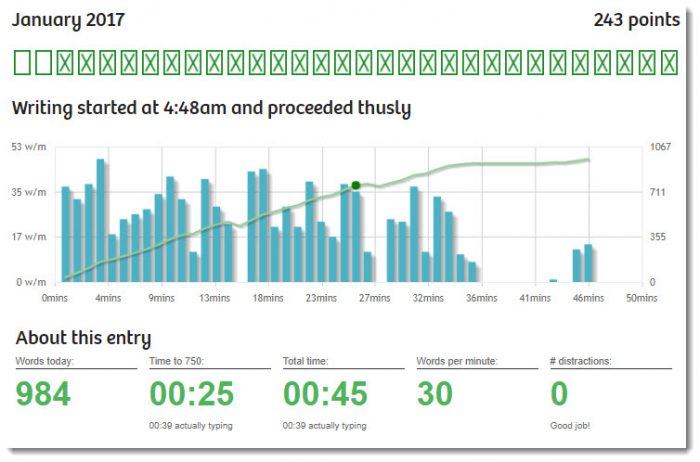
Screenshot from 750words.com showing statistics from Day 1 of my writing challenge
I poured myself out of bed that morning. Although I’m truly a morning person, it had been ages since I’ve gotten out of bed at dark o’clock.
It was the dead of winter and it’d be another three hours before the sun would peek over the horizon.
I took care of my biology needs, made some tea, then thumped back to my office. I was excited to write. I had authored seven non-fiction books and was eager to start working on my first novel.
The idea for the novel came to me in 2010 while teaching an adult Bible class and the characters were nudging and reminding me that they needed to get out of my head and on to paper.
I had spent three days drafting up a chapter by chapter outline of the plot and characters. So, when I sat down at my desk, I already had a plan. My plan was to write, at minimum, 750-words each day following my outline.
Why 750-words and why write so early?
I needed a time in the day that I could control. A time of the day where there would be minimal distractions. By getting up before 5am to write, I knew that my mind would be fresh enough to stay focused on the task at hand.
I chose 750-words based on the advice of writing mentor, Julia Cameron. In her book entitled The Artist’s Way, Cameron called the three pages of content (equivalent to 750 words) written early in the day morning pages.
She recommends using morning pages to get all that “angry, whiny, petty stuff” out of the way, the stuff that “stands between you and your creativity.”
I didn’t feel like writing angry, random words.
I was going to use the time to drain my mind of this historical fiction. Every morning, even on the weekends, I’d wake at 4:30am, make some tea, then start writing before 5am.
The characters and plot started to take shape. Their personality and moods started to become real. The conflicts and drama within the fictional world was rich and complex.
I couldn’t believe that I was maintaining a consistent pattern of waking early, writing, then repeating the process the next day. As an INFP, I’ve always had trouble sticking to a routine for far too long. I long for spontaneity, yet here I was following a solid structure for almost two months.
But it was the 59th consecutive day of writing before 5am that Cameron’s words came back to me.
Instead of writing another chapter for my novel, which had reached 49,000 words, I got up that morning and wrote about a professional setback I had experienced. I got all that angry, whiny, petty stuff out of the way and opened the door to a portion of myself that I hadn’t noticed before.
It was in that moment that I realized that although my goal was to use that time to give my characters a voice, the character I had to develop was me.
I continued writing each morning, but I put the historical fiction to rest. My writings took on a different tone as I started to dig deep into my interior to mine for the gloomy gold stuck in the darkest parts of my being.
It was a chaotic journey. I was writing without a plan. I was writing without editing or censoring myself, a process known as expressive writing. Some days, I wrote 750-words; other days, I wrote 3000 or more. The most words I wrote in one sitting was just over 5000 words. The more I wrote, the more I unpacked, untangled, and unraveled the character called Leesa.
On January 3, 2018, I hit my goal of writing for 365 consecutive days…
That had been my goal since starting this journey a year earlier. Two weeks prior to hitting my main goal, I crossed the half a million words mark. My writings consist of two memoirs, four stage plays, half a historical fiction, a couple of sermons, one non-fiction book (I couldn’t resist), countless personal essays, and numerous entries where I wrote angry words.
Most mornings, I got up at 4:30am. My sleep app is proof of my wake up times. There were some days where I didn’t write until after 5am. So, this isn’t a tale of waking up at 4:30am for 365 consecutive days; instead, this is a story of the lessons I learned along the way. That writing that many words over that period of time has opened me up to some things I never thought possible.
Here are my lessons learned…
Lesson #1: Mix spontaneity with the structure
Some of us are built to follow a routine. Where there is none, we collapse. I’m not one of those people. I may follow a routine for a short while, then I’ll start to look for ways to sabotage it.
As I stated above, I surprised myself with my dedication to waking early to write for 365 consecutive days. The reason I was successful is that I came to understand, through writing, that one of my strengths is improvisation. That’s why I prefer to emcee an event vs presenting at one, or jumping into the car and going where my mood takes me vs planning every step in detail.
Within the structure, I made sure I made room for improvisation. For example, I’d put together an outline for the chapters I wanted to write in my memoir. That’s the structure. When I sat down to write, I’d chose the chapter based on my mood. So, if I woke up and felt like writing chapter 20, I’d do that. Then, the next day, if I felt like writing chapter 4, I’d do that. Although I wouldn’t write the memoir in chronological order, I was able to stay married to the structure by adding a bit of spontaneity.
Lesson #2: Honour the in-between stage
Writing was helping me move from one identity to another. I knew that my days in the tech industry were over. I kept getting sign after sign after sign that it was time to move on. I didn’t know where I was moving to. And the only time I became anxious about my identitylessness was when I was around other people.
Whether I was attending a social or business gathering, I’d invariably be asked:
“So, what do you do?”
Such a tired, unproductive, and lazy question.
“I’m a writer,” I’d say.
“What do you write?”
“Words.”
“What type of words?” The person would look around uncomfortably, wondering if they were being punked.
“English words.”
Then, they’d offer a fix or a solution.
You can publish a book.
You can coach others on how to write their first book.
You can teach others how to develop a habit around writing.
You can do a TED Talk.
Or, if it wasn’t a fix, they would brag about how productive and busy and super important they were.
I think people thought I was broken.
That if I weren’t writing to meet a publishing deadline, then what was the point. I found it difficult telling people that I was writing, primarily, to heal. To find myself. To get clarity on the next step.
But no one wants to hear a GenXer who’s approaching middle age say, “Well, I don’t know what I want to do with the last half of my life.” So, the fixers tried to fix and the braggers went on to brag.
It’s not entirely their fault. They’ve been taught that capitalism needs to be fed a steady diet of production. Be busy or give the appearance of busyness all the time. There are even courses that teach you how to make money while you sleep.
But what they revealed was their discomfort with my in-between stage. That stage between where I was (production without rest) and where I will end up (contribution with spaciousness). Writing was helping me reframe, not only my contract with capitalism, but also my connection with my labels.
The in-between stage was where I needed to be at that moment in my life. Because being identityless is a temporary stage. It may last a month; it may last a decade. I just sat in concert with the Divine and let writing be my guide.
Lesson #3: Writing is a form of activism
I’m a highly sensitive introverted empath.
That means that marching through the streets with placard signs to protest some sort of grievance just doesn’t align with my personality. The loud noises, the weather conditions, and the heightened energy would drain me quickly.
In my year of writing, I discovered that my words hold power. History is rich with a pedigree of writivists, writers who use words to inspire action.
Martin Luther inspired the reformation with the Ninety-Five Theses.
Maya Angelou inspired women of all races to find their courage through her poems.
A single tweet can be shared tens of thousands of times and inspire outright rage or quiet applause.
I can arrest attention with my words. As Julia Cameron writes in her book, The Artist’s Way, “attention is an act of connection.” I can inspire action with my sentences. I can influence change through one article.
Lesson #4: Remembrance is a sacred act
For a long time, I hid my history degree.
I learned that as a woman in tech, my liberal arts degree was a liability, not a strength. Hiding my degree led me to keep many of my achievements and accomplishment hidden behind the cult of humility.
It was challenging enough being a Black woman in tech. I didn’t need to isolate myself further by bragging about the awards I was getting that my white male counterparts were not.
But in my year of writing, I decided to look back.
I dug up all the articles I had ever written as a freelance journalist. I re-read them and could see that even back then, I had a masterful gift of using words to advocate for causes I believed in.
I stumbled upon newspaper clippings that had been written about the very first dot com I launched back in 1999. Then more newspapers clippings about the awards I had won.
As I continued to write about what I was uncovering, I was reminded that history holds the wisdom we seek. Often in our search for identity, the answers are held firmly in the past.
Lesson #5: Saying no is a spirit-rich experience
I suffered from a disease to please. I’d say “Yes” to anyone and everyone, even if the project, person, or philosophy didn’t line up with my desires or values. I didn’t know I was suffering from the Yes Syndrome until I dated yet another emotionally unavailable man.
I used expressive writing to write through the feelings. To dig deep. It took some time, but I was able to make the connection between my need to please and the absence I was feeling deep in my heart. I was so desperate to be accepted, I said “Yes” to avoid rejection.
So, I started saying no. A lot. As William Ury points out in his book, The Power of Positive No, when you know what you’re saying yes to, you empower your no.
I knew I was saying yes to writing my first novel.
I knew I was saying yes to becoming a full-time writer.
I knew I was saying yes to wherever God was taking me.
These were the things I was saying yes to. Because I knew my yes, I was more confident about my no.
Lesson #6: Words can heal your lineage
I’ve always been interested in uncovering my ancestors’ stories. In my year of writing, I dug deeper into my lineage. As I started to strip away the layers, I came in contact with the choices my ancestors made so long ago.
I am a first generation Canadian of Jamaican descent. I know that I exist because white people and black people came into contact with each other on the island. I didn’t want to face it, but I knew that my ancestors’ interactions were a product of the realities of that day.
My paternal side of the family is descended from slaves who were forcibly relocated to Jamaica from West Africa, namely the Akan people of present day Ghana. According to oral history from my great-grandfather, my paternal line took their last name from the owner of the plantation who was originally from Britain.
My maternal side of the family is descended from a white Frenchman who settled on the island as a refugee. He landed in Jamaica after escaping the white massacre on the island of Haiti shortly after the latter’s independence in 1804.
I am a paradox. Whiteness and blackness are in my lineage. So, too, is the blood of both the oppressor and the oppressed. I wrote through my anger and disgust. The more I wrote angry, unfiltered words, the more I started to heal around the choices my ancestors made so long ago.
Dr. James Pennebaker has studied the power of expressive writing for over 20 years. His research has shown that write therapy is as powerful as talk therapy in changing human behaviour.
As a result, I’m no longer embarrassed that slavery is in my ancestry. I’m also no longer angry about the choices my white ancestor made so long ago. Writing has helped me to hold compassion for the intersectionality of who I am.
For without the choices they made so long ago, I would not be.
Lesson #7: Rest is a revolutionary act
Slavery was a brutal, violent, and oppressive system. My ancestors got up at the crack of dawn to work on the sugar cane plantations. It was gruelling work.
On top of that, they were not paid, not given benefits, nor time off. To encourage their participation in system which exploited their physical and emotional labour, their bodies were beaten and brutalized.
Knowing what my ancestors went through, I honour them by incorporating periods of rest into my weekly routine. I honour a 24-hour period where I cease from all my work. This personal sabbath helps me to refresh my spirit and renew my mind.
Resting from work is one thing; being able to sleep peacefully at night is another. When I go to bed at night, I’m not worried that the slave master will creep in and sexually assault me. I’m not sleeping on the floor inside a small room with a dozen other slaves. I sleep peacefully and wake up fully refreshed.
Slowing down and taking time to rest fully is anti-patriarchal and anti-capitalist. I listen to my body and if it tells me that it just doesn’t want to participate in the rigours of work, I simply abstain. For those reasons, I see rest as an act of resistance.
I don’t rest from writing simply because I don’t see it as work. In a point I’ll explain more fully below, I see writing as a form of prayer. So, I write daily. And writing has helped me be more in tune with when I need rest.
Lesson #8: Question your internal oppression
One of my blog posts went viral in October 2017. To give you context – a post on my blog is typically shared 50 times; the one that went viral was shared just over 11,500 times.
That blog post was birthed out of an interaction with a man, let’s call him Mark, who, after sharing his woes about being poor white man “and nobody like me,” dismissed my help and called me a “Wholefoods leftist American” (I’m a centrist Canadian) when I gave him a few questions to write through to help with his anger.
Since he rejected my help, I put the questions into a blog post and shared it. I’ve heard from people who have used the nine heat-seeking questions in the blog post in workshops, coaching groups, at family get togethers, and as a personal guide to help with their own writing.
Those nine questions were birthed when I sought to uncover my internal oppression. The toxic thoughts I had around my gender. The belligerent beliefs I had around my race. Accepting what others have told me about my skin colour, nationality, religion, sexual orientation, body, and life choices.
It had to stop. As Lama Marut states in Be Nobody:
“[W]hen we wholly identify with one player or another in this revolving cast of characters, we set ourselves up for confusion, dissatisfaction, and frustration. We are confused about which of the multiple roles truly identifies us; we are dissatisfied by the attempt to make any one of these parts truly fulfill us; and we are frustrated by the limitations inherent in each and every one of these personae.”
It was time to remove the confusion. So, I used curious inquiry to question my toxic thoughts around who I am. I took the time through writing half a million words to dismantle, deconstruct, deprogram, and decolonize my mindset.
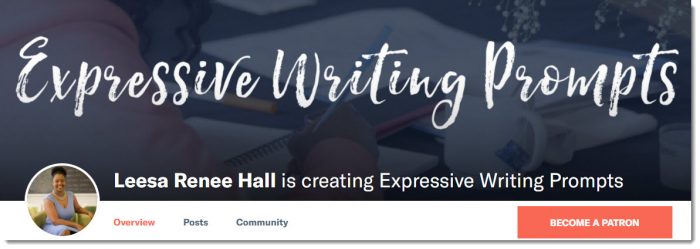
Get fresh, new expressive writing prompts each week to help you question your internal oppression by becoming a patron. Click on the image above for more.
Lesson #9: There’s gold in the gloom
I spent the month of April 2017 saying goodbye to my identity as a tech diva by writing a memoir about my 15-years working in a white male dominated field as a Black woman with a liberal arts degree. Like, talk about triple whammy. I wasn’t white, nor a man, nor did I hold a computer science or engineering degree.
Most people in the tech industry didn’t care, but for the few who discovered my “secret,” they made my experience hell. But I fought back in calculating ways. I always came out on top, but it cost me my peace and tranquility.
As I recalled those memories, I was taken back to a time when my soul felt under assault every day. Because of my background as a historian, I kept every written piece of paper, including emails. I re-read the hurtful words people wrote in emails and in the comments of my blog. Those words brought back my anger and sadness.
It was tough. Really, really tough. There was point where I had to stop writing a few chapters because I didn’t want to relive those memories.
But on the other side of the gloom is gold; a rich reward of clarity and compassion after confronting the ugliness.
My reward was 80,000 glorious words for a memoir code named, Operation Bulldoze. The other reward was finally letting go of the people who hurt me professionally and personally along the way. They no longer hold any power over me.
Lesson #10: Your eat pray love moment can happen in your own home
Some are able to find themselves by going on a trip to some mystical, exotic place in the mountains where they write, paint, and meet a spiritual guru who utters three words that take the air out of the atmosphere.
My eat pray love experience was anything but. It was unglamorous, dull, and hidden.
I didn’t eat exotic foods. Instead, I ate the words of my soul.
I didn’t go to the far east to find my spirituality. Instead, I found the Divine in the quietness of the wee early mornings at my desk, with only the moon and then the sun as my witnesses.
I didn’t find love with another human being. I found the courage to finally love myself.
You don’t have to skydive out of an airplane, climb Mount Everest, or fly to a silent retreat in the far east.
Using the power of expressive writing, your eat pray love moment can take place in the quiet of your home at a time of day when you won’t be disturbed.
Lesson #11: Words are holy
In December 2017, I posted words to my Facebook profile questioning the whiteness in my bloodline.
After almost 300 reactions, Facebook removed it stating that my post violated community guidelines.
I considered Facebook’s removal of my words an act of violence.
As a result, I stayed off Facebook for eight days grieving the thoughtless erasure of my words. This was a big deal because my typical behaviour is to check Facebook at least six times a day.
The reason for my grief is that I give birth to these words through a sacred time I spend with God. As I write each morning at 4:30am, I’m in communion with the Divine.
Going through a daily practice of writing has taught me to be more reflective and selective about the words I choose to represent my ideas, values, and thoughts. I cannot carelessly throw out word bombs just so I could get a reaction.
As I went from novel writing to expressive writing and finally landing on activist writing, there was reverence over each word that poured out of my soul through my fingertips and on to the screen.
When I re-read what I had written, I was mystified that those words came from me. They sounded so poetic, so deep, so moving.
That’s when it became clear that the words I write are holy because they come through me from the Divine. So, if someone enjoys what I’ve written, it’s the Divine they praise, not me. If someone doesn’t like what I’ve written, it’s the Divine they dislike, not me.
Writing is an ability that God breathed into me when I was created; it only took writing half a million words over 365 days to make me to realize this. So, people can react how they choose. I simply write for that’s what God has called me to do.
I know that I will play the organ at yet another funeral…
As I come out of my year of writing just over 500,000 words over 365 consecutive days, a quote from Muhammad Ali comes to mind:
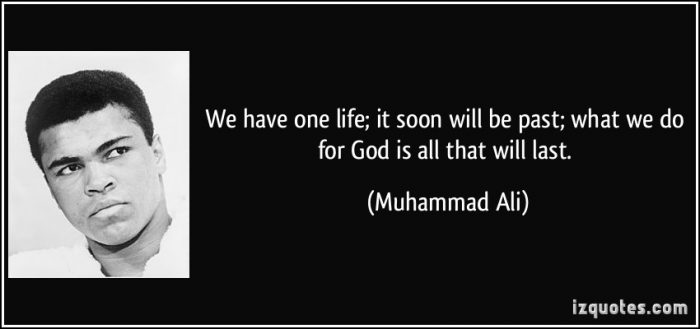
“We have one life. It will soon be passed. What we do for God is all that will last.”
Ultimately, it really doesn’t matter what anyone says at another person’s funeral. People will tell the story that is true for them about the dearly departed.
What matters to me is speaking at my own funeral. For if I’ve lived my life with an aim to die empty, my words will tell my story for generations to come.
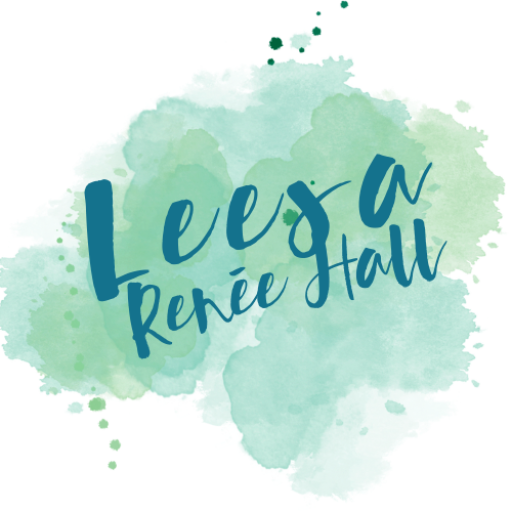
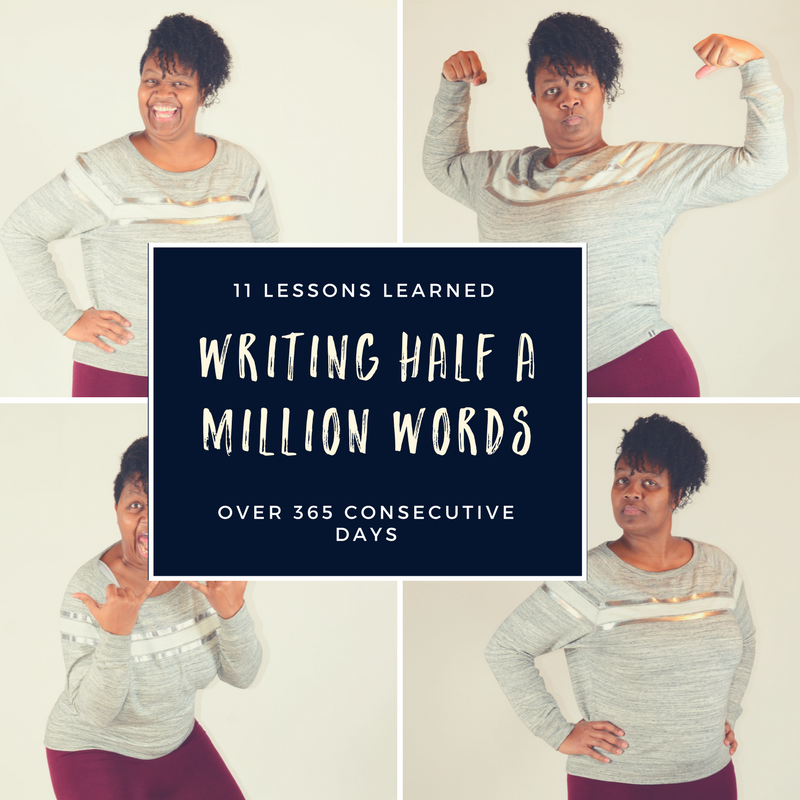
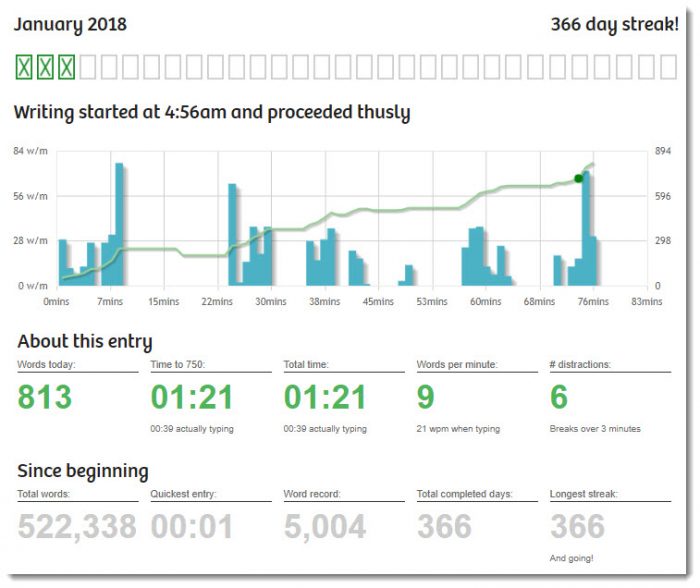
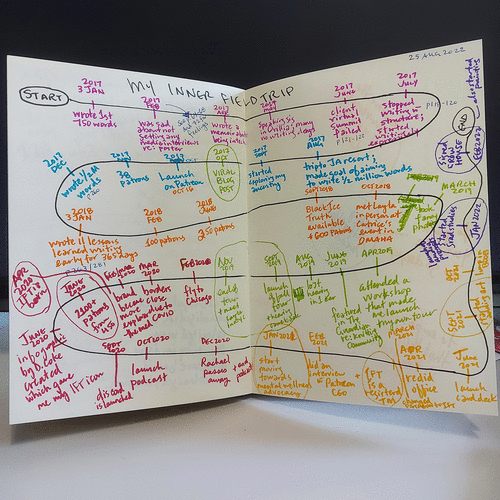
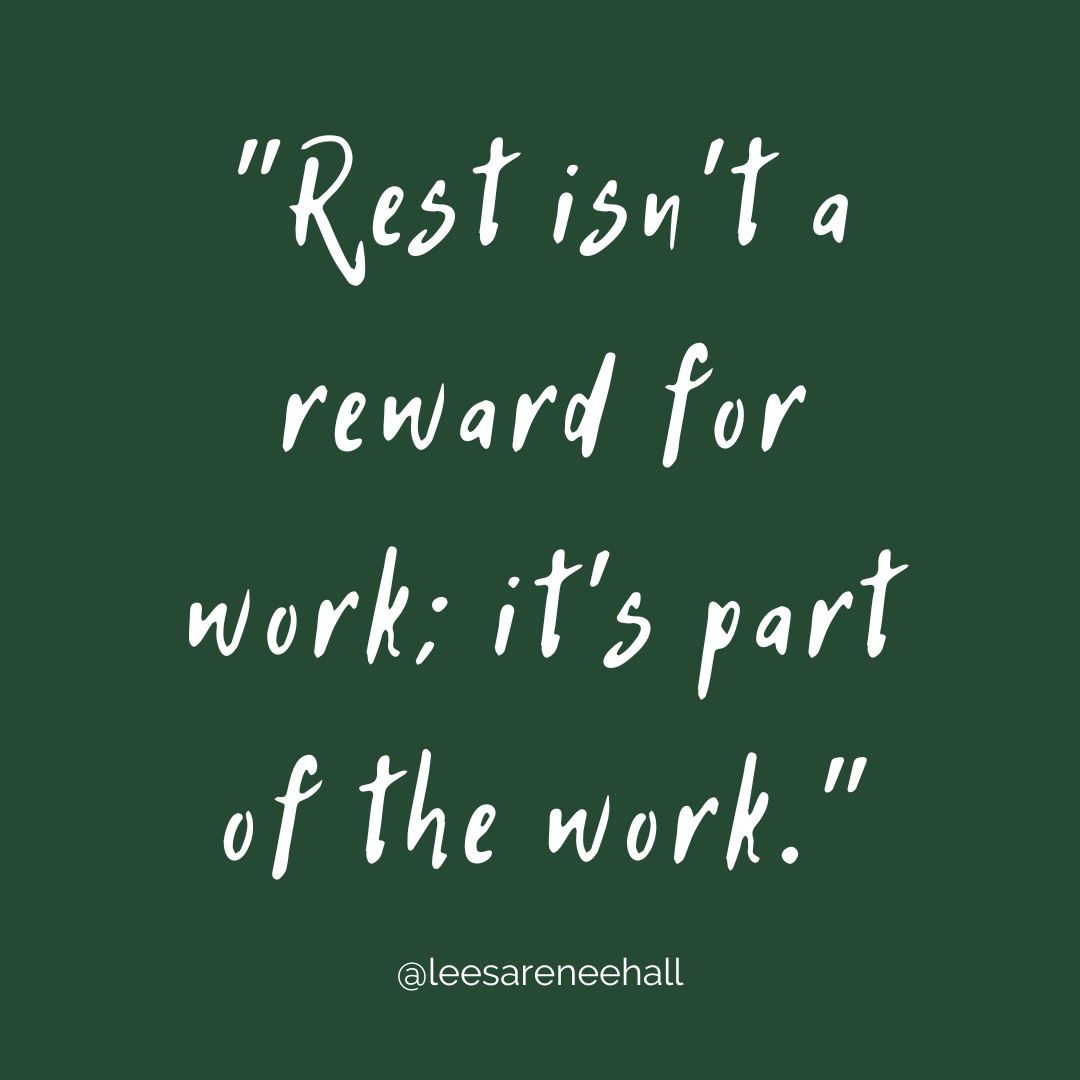

0 Comments
Trackbacks/Pingbacks